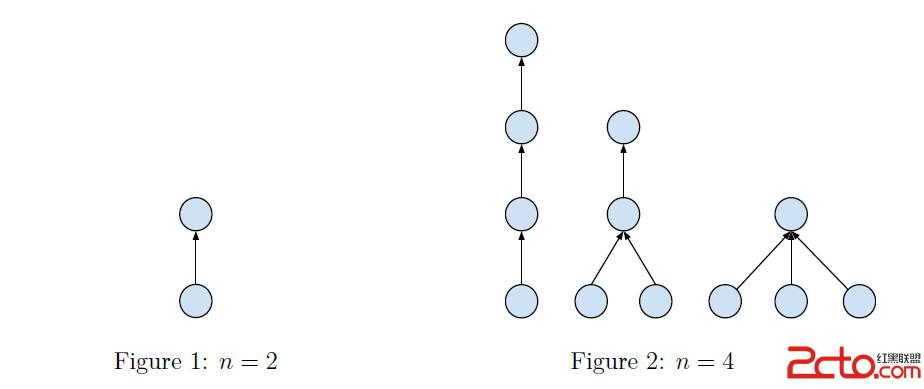hdu 4472 Count (遞推)
Count
Time Limit: 2000/1000 MS (Java/Others) Memory Limit: 32768/32768 K (Java/Others)
Total Submission(s): 1756 Accepted Submission(s): 1133
Problem Description
Prof. Tigris is the head of an archaeological team who is currently in charge of an excavation in a site of ancient relics.
This site contains relics of a village where civilization once flourished. One night, examining a writing record, you find some text meaningful to you. It reads as follows.
“Our village is of glory and harmony. Our relationships are constructed in such a way that everyone except the village headman has exactly one direct boss and nobody will be the boss of himself, the boss of boss of himself, etc. Everyone expect the headman
is considered as his boss’s subordinate. We call it relationship configuration. The village headman is at level 0, his subordinates are at level 1, and his subordinates’ subordinates are at level 2, etc. Our relationship configuration is harmonious because
all people at same level have the same number of subordinates. Therefore our relationship is …”
The record ends here. Prof. Tigris now wonder how many different harmonious relationship configurations can exist. He only cares about the holistic shape of configuration, so two configurations are considered identical if and only if there’s a bijection of
n people that transforms one configuration into another one.
Please see the illustrations below for explanation when n = 2 and n = 4.

The result might be very large, so you should take module operation with modules 10
9 +7 before print your answer.
Input
There are several test cases.
For each test case there is a single line containing only one integer n (1 ≤ n ≤ 1000).
Input is terminated by EOF.
Output
For each test case, output one line “Case X: Y” where X is the test case number (starting from 1) and Y is the desired answer.
Sample Input
1
2
3
40
50
600
700
Sample Output
Case 1: 1
Case 2: 1
Case 3: 2
Case 4: 924
Case 5: 1998
Case 6: 315478277
Case 7: 825219749
對於每個合法圖形,記最底層個數為j,則再增加一層增加的個數必須是j的倍數。可以用dp[i][j]表示i個點最底層為j個時的個數,對於數據范圍內的N遍歷得到答案。(屬於“我為人人”型的遞推關系)
dp[i][j]-->dp[i+j*k][j*k](k=1...N)
#include
#include
#include
#include
#include
using namespace std;
#define N 1010
#define LL __int64
const int mod=1000000007;
int f[N][N],ans[N];
void inti()
{
int i,j,k;
memset(f,0,sizeof(f));
f[1][1]=1;
for(i=1;i<=1000;i++)
{
for(j=1;j<=1000;j++)
{
if(f[i][j]==0) //由當前合法狀態推得其他狀態
continue;
for(k=1;k<=1000;k++)
{
int t1=j*k;
int t2=t1+i;
if(t2>1000)
break;
f[t2][t1]+=f[i][j];
if(f[t2][t1]>=mod)
f[t2][t1]%=mod;
}
}
}
for(i=1;i<=1000;i++)
{
int tmp=0;
for(j=1;j<=i;j++)
tmp=(tmp+f[i][j])%mod;
ans[i]=tmp;
}
}
int main()
{
int n,cnt=1;
inti();
while(scanf("%d",&n)!=-1)
{
printf("Case %d: %d\n",cnt++,ans[n]);
}
return 0;
}
